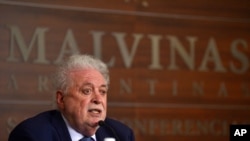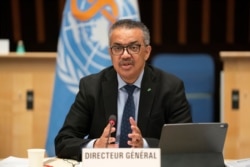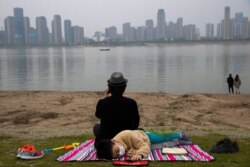Argentina’s health minister has resigned after he reportedly gave preferential treatment to those with personal connections when authorizing coronavirus vaccinations.
The Associated Press reported that President Alberto Fernández, through his chief of staff, asked for Minister of Health Ginés González García's resignation Friday after a high-profile local journalist said he had been vaccinated after personally asking the minister.
González García had led the country’s COVID-19 strategy.
The journalist was one of at least 10 people reported to have been inoculated without following protocol.
The scandal heightened concerns about corruption in the region, as well as access to limited doses of vaccines.
Two Cabinet officials in Peru resigned earlier this month following reports of hundreds of Peruvian officials inappropriately receiving vaccine doses.
Praise from WHO
Meanwhile, the World Health Organization said it welcomed the recent pledges of coronavirus vaccines from several Western countries to the international health group that will help ensure an equitable allocation of vaccines around the world.
“There is a growing movement behind vaccine equity, and I welcome that world leaders are stepping up to the challenge by making new commitments to effectively end this pandemic by sharing doses and increasing funds to COVAX,” Dr. Tedros Adhanom Ghebreyesus, WHO director-general, said recently. COVAX is the mechanism WHO established for the global distribution of coronavirus vaccines.
German Chancellor Angela Merkel said Friday that the pandemic would not end until the world was vaccinated. In remarks after the videoconference of leaders of the G-7, the group of the largest, developed economies, she said Germany and other wealthy countries might need to give some of their own stock of vaccines to developing nations.
French President Emmanuel Macron told the conference that Europe and the United States must quickly send enough COVID-19 vaccine doses to Africa to inoculate the continent's health care workers or risk losing influence to Russia and China.
The coronavirus death toll on the African continent surpassed 100,000 Friday, as African countries struggle to obtain vaccines to counteract the pandemic.
South Africa alone accounts for nearly half of the confirmed deaths in Africa, with more than 48,000, according to data from the Johns Hopkins University Coronavirus Resource Center in the U.S. The country, which is facing its own variant of the virus, also accounts for nearly half the confirmed cases in the region, with more than 1.5 million. Total cases across the African continent are more than 3.8 million.
The 54-nation continent of about 1.3 billion people reached 100,000 deaths shortly after marking one year since the first coronavirus case was confirmed on the continent, in Egypt on February 14, 2020.
The actual death toll from the virus in Africa is believed to be higher than the official count as some who died were likely never included in confirmed tallies.
Russian vaccines
Russia’s deputy prime minister said Saturday on state television that Russia was on target to produce 88 million coronavirus vaccine doses in the first six months of 2021. Tatiana Golikova said 83 million of the doses would be the Sputnik V vaccine.
Russia’s prime minister, also speaking on state television Saturday, said that Russia had approved a third coronavirus vaccine for domestic use.
Mikhail Mishustin said the first 120,000 doses of CoviVac, produced by the Chumakov Centre in St. Petersburg, would be released in March.
California’s governor said his state would set aside 10% of its vaccines for teachers and school employees, beginning March 1. While the Centers for Disease Control and Prevention has urged U.S. school districts to reopen, teachers unions have pushed back against the action, saying safety precautions, such as vaccines for school staff, need to be in place first.
Denmark is imposing stricter regulations at some of its border crossings with Germany and has temporarily closed others because of a COVID-19 outbreak in the German town of Flensburg.
“Therefore, we are now introducing considerably more intense border checks and closing a number of smaller border crossings along the Danish-German border," Danish Justice Minister Nick Haekkerup said in a statement.
Johns Hopkins reported Saturday afternoon EST that there were more than 110,940,000 global COVID-19 cases. The U.S. had more cases than any other country with 28 million, followed by India with 10.9 million and Brazil with 10 million. Global deaths were more than 2.4 million.
Book deal
A major publishing company has picked up a self-published children’s book, illustrated with simple line drawings, about a little boy struggling with all the changes in his life because of the COVID-19 pandemic.
When Can I Go Back to School was written by Anna Friend, a theater director, about her son Billy. She told The Guardian newspaper, “I wrote the book to try and understand what was happening to him.”
She asked Jake Biggin, a friend who is an artist, to do the illustrations. They started selling the book on Amazon and now they have a deal with Scholastic.








